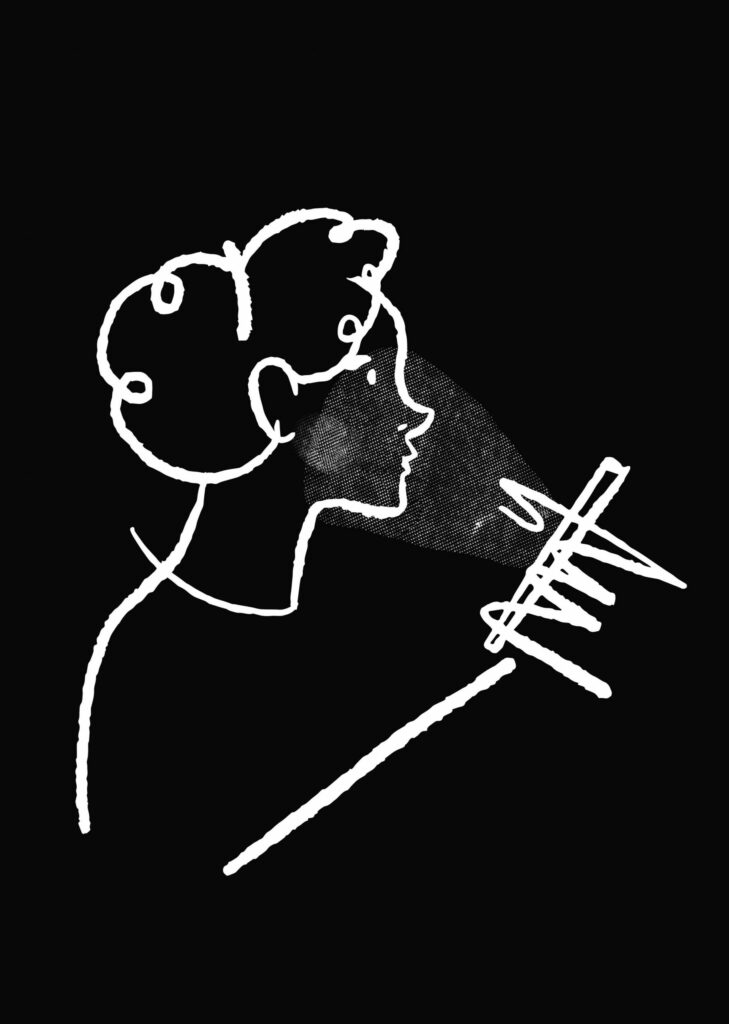Anyone who turns to reading to get away from their screen might be tempted to give up entirely on contemporary literary fiction. The internet — perhaps the greatest threat to the novel in the attention economy — has also been, recently, its greatest obsession. Patricia Lockwood’s No One Is Talking about This replicates in its lyrical fragments the semi-conscious haze of scrolling through a social media feed. If you’re in the market for something harsher, there is Lauren Oyler’s caustic satire of online narcissism, Fake Accounts. And now we have a Canadian addition to the plugged-in canon: Monica Heisey’s debut novel.
Really Good, Actually is the first-person account of Maggie, a twenty-nine-year-old who is dealing with her recent divorce. Or, rather, not dealing with it: Maggie is what we’d label a “hot mess,” prone to self-destructive behaviour and social catastrophe. In other words, this is largely a meditation on the quotidian tragicomedy of life after love.
Maggie’s ex-husband, Jon, was a source of both emotional and financial security; without him, she drifts, unmoored, through Toronto’s bleak rental market and bleaker dating scene. Maggie is a well drawn portrait of an urban millennial: highly strung and poorly paid, funny with a strong undertone of existential dread, and very, very online. She is part of a group chat, a gaggle of lightly sketched friends fading in and out of her life. She posts “Instagram Stories containing oblique references” to her “emotional state.”
The book includes unmediated excerpts from Maggie’s inbox, her Tinder DMs, her increasingly unhinged Google search history. Heisey incorporates such material artfully and convincingly, without a whiff of gimmickry or “kids these days” didacticism. Perhaps this is because Heisey is less interested in the internet itself than in its literary effects: most notably, the narrative mode it has delivered, a form we might call the bite-sized confessional. “Although my personal life was in shambles,” Maggie tells us at one point, “my tweets about it were doing great.”

One very online urban millennial.
Visuals; Unsplash
Maggie follows Twitter accounts that post “screenshots of bad Tinder exchanges, degrading tales of dates gone wrong, crying selfies featuring deep cleavage, etc.” Anyone who’s still on the platform knows the brand: wry self-deprecation, a hilarious disclosure of messiness, a choreographed performance of vulnerability. Keep writing in this vein, past your allotted 280 characters, and you end up with the overly personal essay, a style so ubiquitous in the mid-2010s that Slate once described it as the “first-person industrial complex.” Consider such sensational dispatches as “An Escort Taught Me How to Sell Myself to Strangers Online” (Vice); “I Had a Threesome with My Best Friend and Our Engaged Boss” (xoJane); and “My Brief Career as a Waitress Dominatrix” (BuzzFeed). Throughout the 2010s, especially, this sort of scandalous mini-memoir chronicled spectacularly some writers’ bad decisions with wit and audacious honesty.
Say even more — say, 400 pages’ worth — and you might well arrive at something like Really Good, Actually. Indeed, this is an extended personal essay of sorts — call it “What It’s Like to Be Divorced in Your Twenties”— which offers the various satisfactions of the soul-baring genre. Observational humour: check. Heisey, a comedian and scriptwriter, is trained in the art of the quip. Describing a nouveau hipster, for example, she writes: “His flannel shirt and ripped jeans seemed fused to his body, like someone had vacuum-packed Kurt Cobain to store over winter.” Chaotic sexual encounters: check. Maggie has a series of post-breakup liaisons, culminating in a depressing impromptu threesome at her friend’s wedding. Pithy aphorisms about modern life, unabashed over-sharing, the banalities of self-care: check, check, check.
But all of this frothy hilarity is the bait before the switch. Heisey deliberately stretches the viral-confessional mode to the breaking point. As Maggie spirals, the one-liners pile up with unsettling intensity, in an endless and eventually discomforting gag reel. We start to get the sense that her account is not so much untrammelled interiority as brittle exteriority. The interposing of her search history is funny, but it also functions as a narrative release valve from her relentlessly curated monologue, making the return to her first-person voice even more airless. All around her are the contours of other lives, other tragedies — that of her friend Amirah, who works at a hospital, or the death of someone’s father. But Maggie’s narrative excludes them in its single-minded self-centredness. “So much stuff is happening and you’re missing it,” Amirah warns her. It takes a tragedy Maggie cannot ignore before her whole paper-thin facade disintegrates. What’s left is selfishness, pettiness, fear: deeply human flaws that add up to a more compelling portrait than the airbrushed persona of her own invention. It’s a curious and timely formal experiment, on Heisey’s part, to employ a first-person narrator with such a powerful compulsion to be admired: “a main character,” as the author has described her, with “main character syndrome.”
Maggie often acts as if she is on stage and under the spotlight. Her therapist advises her to make a conscious distinction between actual friends and an imagined audience. “These are very different kinds of relationships, with very different obligations and mores,” she tells Maggie. “And then, of course, one of them exists in the mind only.” The problem is that for Maggie, her audience is not imagined. Her tortured comedy routine is seen and rewarded, both by her faceless online followers and by us. She is by no means irredeemable. She is capable of empathy, betterment, genuineness, but this content does not, as they say, “perform well.”
Then again, the mood is shifting, as it often does in our frantic culture. “You don’t have to say everything you think and feel to everyone around you all the time,” Maggie tells her father, in a moment of naive revelation. “You can keep it to yourself.” Most major outlets have shuttered their “personal experience” sections. There has been a broader reckoning with the deleterious effects of literary over-sharing. Even Twitter is reported to be on the verge of collapse. The bite-sized confessional, it seems, is at a low ebb. But if you were looking for a eulogy — a diligently rendered memorial to a flawed form — you would find a fitting one in Really Good, Actually.
Richard Joseph lives and studies in Montreal.

